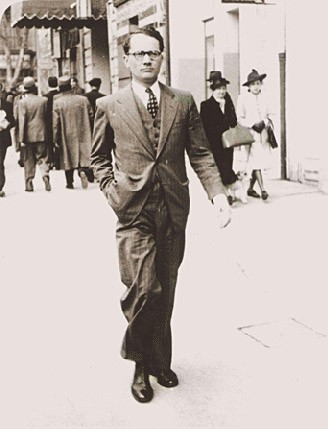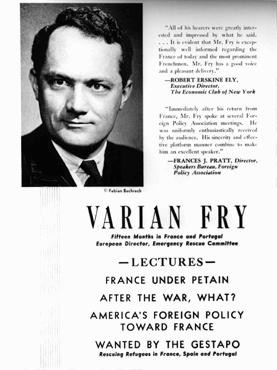Varian Fry
Varian Fry (1907–1967) was an American journalist who helped anti-Nazi refugees escape from France between 1940 and 1941.
Key Facts
-
1
After France surrendered to Nazi Germany in June 1940, the Emergency Rescue Committee, a private American relief organization, sent Fry to Marseille to aid anti-Nazi refugees who were in danger of being arrested and turned over to authorities in Nazi Germany.
-
2
Fry used legal and illegal techniques to help some 2,000 people, including a number of prominent writers and artists, escape France and emigrate to the United States.
-
3
Varian Fry was the first American to be named “Righteous Among the Nations” by Yad Vashem (Israel’s official memorial to Holocaust victims) for risking his life to rescue Jews.

Varian Fry (1907–1967) was an American journalist who helped anti-Nazi refugees escape from France.
Varian Fry was born in New York City on October 15, 1907. He graduated in 1931 with a degree in classics from Harvard University, moved back to New York City, and married Eileen Hughes, an editor at Atlantic Monthly. Fry worked as a researcher and editor at a number of magazines in the early 1930s, during which time he traveled to Nazi Germany to report on the country under Hitler’s rule. Upon witnessing an anti-Jewish riot in Berlin on July 15, 1935, Fry wrote several dispatches for the New York Times, describing what he had observed.
“I saw one [Jewish] man brutally kicked and spat upon as he lay on the sidewalk, a woman bleeding, a man whose head was covered with blood, hysterical women crying. . . . Nowhere did the police seem to make any effort whatever to save the victims from this brutality.”
—Varian Fry
After the outbreak of the Spanish Civil War, Fry resigned as editor of the foreign policy magazine The Living Age to work for the North American Committee to Aid Spanish Democracy. Despite its name, the committee supported the Republican side of the war, which included communists, and Fry, a fervent anti-Communist, resigned in June 1937. With wars breaking out all over the world, Fry began writing books for the Foreign Policy Association, including War in China, The Good Neighbors (about US relations with Latin America), Bricks Without Mortar (about international diplomacy), War Atlas, and The Peace that Failed (about the Nazi seizure of Czechoslovakia).
The Emergency Rescue Committee
After Germany invaded France, Fry helped gather more than 200 notable Americans, including journalists, museum curators, university presidents, and artists—as well as a number of Jewish refugees—at the Hotel Commodore in New York on June 25, 1940. During that meeting, the group founded the Emergency Rescue Committee (ERC), a private American relief organization, with the goal of rescuing endangered intellectuals in France. The armistice agreement detailing France’s surrender to Germany, signed a few days before the ERC founding meeting, included “Article 19,” nicknamed the “Surrender on Demand” clause. Authorities in Vichy France, the southern half of the country which was not occupied by Germany, agreed to arrest and “surrender” any individuals the Germans “demanded.” The Emergency Rescue Committee vowed to aid anti-Nazi writers and artists, Jews and non-Jews, who were likely to be targeted by Nazi Germany.
A few days after the founding meeting, several members of the newly created ERC met with First Lady Eleanor Roosevelt, who used her influence to obtain “emergency” non-quota visas for a number of endangered intellectuals. The ERC decided they needed a representative in France to guide their rescue efforts. Varian Fry volunteered, and flew to Europe on August 4, 1940. He planned to be in southern France for three weeks.
Establishing the Centre Americain
Fry landed in Lisbon, Portugal, where he met Waitstill Sharp, a Unitarian minister who had been active in rescue efforts both in Prague and southern France. Sharp gave Fry advice and lists of sympathetic contacts in Marseille. Fry realized upon arriving in France that the plight of anti-Nazi refugees was far greater than the ERC had imagined. He advertised his presence in the city, meeting with refugees in his room at the Hotel Splendide, and quickly befriended American vice consul Harry Bingham Jr. Using his position as an American diplomat, Bingham extended aid to refugees and even hid endangered author Lion Feuchtwanger in his home.
Needing a more formal space, Fry leased an office on rue Grignan (and later on boulevard Garibaldi) and gathered a staff, a mix of Jewish and non-Jewish refugees including artist Bill Spira, future Bard College professor Justus Rosenberg, and future economist Albert Hirschmann, as well as American expatriates Miriam Davenport, Mary Jayne Gold, and Charlie Fawcett.
Rescue Efforts
Almost immediately after arriving in Marseille, Fry met German Jewish writer Franz Werfel, who, with his wife Alma Mahler Werfel, needed to escape France to avoid arrest. In early September 1940, Fry purchased train tickets for himself, the Werfels, and family members of novelist Thomas Mann (who had already made it to the United States). The group took the train to Cerbère, on the border of Spain. While Fry traveled by train with the luggage to Port Bou, the refugees, who did not have Spanish entrance visas, crossed the Pyrenees on foot to avoid border guards. They were successful, and reunited with Fry before traveling on to Lisbon, where they boarded a ship for the United States. Once he was in the United States, Werfel explained his escape to a reporter. This ultimately alerted US State Department officials to the fact that Fry was breaking international laws to aid refugees.
Fry continued his efforts in France for the next thirteen months. Fry rented the “Villa Air Bel” outside of Marseille, to provide a home for prominent refugees who needed a safe residence. He and his colleagues used legal and illegal means to assist these refugees with their immigration efforts, even utilizing an escape route across the mountains with the assistance of French resistance workers Hans and Lisa Fittko. He assisted artists Marc Chagall, André Breton, André Masson, Max Ernst, and Jacques Lipchitz, poet Walter Mehring, harpsichordist Wanda Landowska, writer Lion Feuchtwanger, and nearly 2,000 others. Fry and some of his American collaborators were arrested by French police in December 1940 and briefly interned on a ship in Marseille harbor during a visit to the city by French leader Marshal Petain. Authorities feared they were planning acts of terrorism.
Expulsion
Fry was specifically trying to aid refugees endangered by Nazi Germany, and his efforts angered Vichy French officials. Moreover, US State Department representatives complained that Fry’s illegal work interfered with American efforts to stay neutral in World War II.
Fry was under constant surveillance and was, more than once, questioned and detained by French authorities. On August 29, 1941, Fry was arrested by the French police and given two hours to pack his belongings before being escorted to the Spanish border. He spent more than a month in Lisbon before returning to the United States in October 1941.
World War II
Less than two months after his return to the United States, Japan’s attack on Pearl Harbor brought the country into World War II. The Emergency Rescue Committee (which in 1942 became the International Rescue Committee) severed ties with Fry due to his outspoken criticism of the State Department. Fry began a new job as the assistant editor of The Nation magazine.
In December 1942, after information about the mass murder of Jews reached the United States, Fry wrote an article for The New Republic magazine titled “The Massacre of the Jews.” After describing events he had witnessed, and information he had received from European correspondents, Fry exhorted readers that all the evidence adds up to “the most appalling picture of mass murder in all human history.”
Fry was deemed unfit for military service, and spent most of the war preparing his memoirs. Eileen Fry passed away in 1948, and a year later, Varian Fry married Annette Riley, with whom he had three children. By the 1960s, Fry was teaching Latin, Greek, and French in secondary schools in Connecticut.
Recognition

Shortly before Fry’s death, the French government awarded him the Croix de Chevalier de la Legion d'Honneur, France’s highest decoration of merit. It was the only official recognition he received in his lifetime.
Fry died in 1967 while revising his memoirs. He left behind a wealth of written and photographic materials that document his experiences in France. Surrender on Demand, his memoir about his experiences in France, had been published in 1945, and Assignment: Rescue, a rewritten version of his first memoir aimed at students, was published shortly after his death.
In 1991, the United States Holocaust Memorial Council awarded the Eisenhower Liberation Medal to Varian Fry. Three years later, Fry became the first American to be honored by Yad Vashem as a "Righteous Among the Nations." In 2000, the square in front of the US consulate in Marseille was renamed “Place Varian Fry.”
Critical Thinking Questions
- What pressures and motivations may have affected Fry’s decision to attempt to rescue Jews in Europe?
- How can individuals contribute to or assist in the rescue of endangered citizens of other nations?

